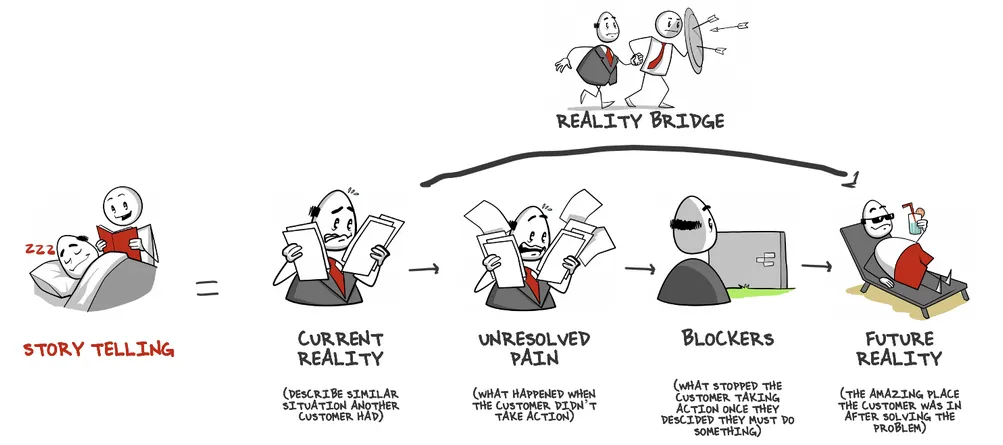Effective Business Storytelling Techniques
In today's information-saturated business environment, the ability to craft and deliver compelling stories is no longer just a nice-to-have skill—it's a strategic imperative for leaders, marketers, and professionals across all disciplines.
Why Storytelling Matters in Business
Stories have been the primary vehicle for human communication for thousands of years. Our brains are literally wired to process, remember, and respond to narratives. In the business context, storytelling offers several distinct advantages:
- ✦ Enhanced Memorability: Information delivered as a story is 22 times more likely to be remembered than facts alone.
- ✦ Emotional Connection: Stories evoke emotions, which are crucial for decision-making and building trust.
- ✦ Simplified Complexity: Narratives help transform complex concepts into digestible, relatable information.
- ✦ Unified Vision: Stories help align teams around shared goals and organizational values.
Core Elements of Effective Business Stories
While business storytelling differs from entertainment, it still relies on fundamental narrative structures. The most compelling business stories incorporate:
1. Relatable Characters
Your story should feature characters your audience can identify with—whether customers, employees, or stakeholders facing specific challenges.
2. Conflict or Challenge
Every compelling story includes tension—a problem, challenge, or opportunity that creates interest and drives the narrative forward.
3. Authentic Context
Grounding your story in real-world situations and specific details enhances credibility and helps audiences connect with the message.
4. Transformative Journey
Show how characters navigate challenges, demonstrating change or growth that supports your key business message.
Practical Storytelling Frameworks
Several proven frameworks can help structure your business narratives for maximum impact:
The Classic Hero's Journey
Adapted from Joseph Campbell's monomyth, this framework follows a protagonist who:
- Faces a significant challenge in their normal world
- Encounters guides or resources that assist them
- Overcomes obstacles and experiences transformation
- Returns with new knowledge or capabilities
Business Application: Perfect for customer success stories, change management narratives, or personal leadership journeys.
The Problem-Solution-Result Framework
A straightforward approach that:
- Clearly articulates a specific problem or challenge
- Introduces a solution or approach
- Demonstrates concrete results or outcomes
Business Application: Ideal for case studies, product demonstrations, or process improvement narratives.
The Sparkline Structure
Popularized by presentation expert Nancy Duarte, this approach contrasts:
- "What is" — the current reality or status quo
- "What could be" — the potential future state
The narrative alternates between these states, building tension until resolving with a call to action.
Business Application: Excellent for vision-setting, change initiatives, or motivational leadership communications.
Storytelling Applications Across Business Functions
Leadership Communication
Leaders use storytelling to:
- Articulate vision and organizational purpose
- Build culture through shared narratives
- Inspire action and motivate teams
- Navigate change and uncertainty
"The most powerful person in the world is the storyteller. The storyteller sets the vision, values, and agenda of an entire generation that is to come." — Steve Jobs
Marketing and Brand Communication
Marketers leverage storytelling to:
- Differentiate products and services
- Build emotional connections with customers
- Create coherent brand narratives
- Enhance content marketing effectiveness
Research shows that brand stories that evoke emotions drive 23% more share of wallet compared to purely functional messaging.
Sales and Client Engagement
Sales professionals use storytelling to:
- Build rapport and credibility
- Make abstract benefits concrete
- Address objections through narrative
- Create memorable client presentations
Studies show that proposals featuring customer success stories have 70% higher conversion rates than those without narratives.
Developing Your Storytelling Skills
Like any business skill, storytelling improves with deliberate practice and refinement. Consider these development strategies:
- 1
Create a Story Repository
Collect stories from customers, employees, and personal experiences that illustrate key business principles or values. Categorize them for different purposes and audiences.
- 2
Practice Deliberately
Incorporate storytelling into regular communications. Start meetings with relevant stories, include narratives in presentations, and use storytelling frameworks when explaining concepts.
- 3
Seek Feedback
Ask trusted colleagues to evaluate your storytelling effectiveness. Which stories resonate? Which fall flat? Use this feedback to refine your approach.
- 4
Study Master Storytellers
Analyze how effective business leaders, TED speakers, and brands use storytelling. Note their techniques and adapt them to your style and context.
Common Business Storytelling Pitfalls
Even experienced professionals can stumble when crafting business narratives. Watch out for these common mistakes:
Storytelling Pitfalls to Avoid
Excessive Complexity
Business stories should clarify, not confuse. Keep narratives focused on key points rather than overwhelming with details.
Inauthenticity
Audiences quickly detect manufactured or exaggerated stories. Ground narratives in truth and genuine experiences.
Missing Relevance
Every business story must connect clearly to your strategic objectives or audience needs. Entertaining stories with no business relevance waste time.
Neglecting Cultural Context
Stories that resonate in one culture may fall flat or even offend in another. Consider cultural perspectives when crafting global business narratives.
Measuring Storytelling Effectiveness
As with any business strategy, measuring the impact of your storytelling efforts is essential:
| Context | Metrics to Consider |
|---|---|
| Leadership Communication |
|
| Marketing Content |
|
| Sales Presentations |
|
| Training/Learning |
|
Al Mithaq Institute's Business Storytelling Training
At Al Mithaq Institute for Educational Services, we offer comprehensive training in business storytelling as part of our business communication curriculum. Our expert-led programs help professionals:
- ✓ Develop personalized storytelling techniques that align with their leadership style
- ✓ Build practical skills through hands-on workshops and real-world applications
- ✓ Create story banks for various business contexts and audiences
- ✓ Integrate storytelling into broader communication strategies
Elevate Your Business Communication Skills
Join our next Business Storytelling workshop and transform how you communicate, lead, and influence.
Contact us today:
+971 4 264 4204 | info@almithaqinstitute.com
FAQ: Business Storytelling
How is business storytelling different from other types of storytelling?
Business storytelling is purpose-driven, focused on achieving specific organizational objectives rather than purely entertaining. It balances creativity with strategic relevance, authenticity, and actionable insights. Unlike fictional storytelling, business narratives must be grounded in truth and deliver clear takeaways that advance business goals.
Can storytelling skills be learned, or are they innate talents?
While some individuals may have natural storytelling abilities, effective business storytelling is definitely a learnable skill. Like any professional capability, it improves with structured learning, deliberate practice, and feedback. Our training programs at Al Mithaq Institute provide frameworks and techniques that help professionals at all levels develop compelling narrative skills.
How do I find stories within my organization?
Valuable stories exist throughout your organization—in customer interactions, employee experiences, innovation processes, and historical milestones. Create systematic ways to collect these narratives through regular team sharing, customer interviews, project debriefs, and milestone celebrations. Document these stories in a searchable repository organized by theme, audience, and purpose.
How can I make data-heavy presentations more story-driven?
Transform data presentations by framing numbers within a narrative context. Start with the business challenge that prompted the analysis, personalize the data with relevant characters (customers, employees, stakeholders), highlight the journey revealed by the data, and conclude with clear implications. Use visualization techniques that show progression or comparison, and consider using metaphors to make abstract concepts more concrete.
Mastering business storytelling is an ongoing journey. By integrating these techniques into your professional communication, you'll create more engaging, memorable, and impactful business interactions that drive results.
For more information about Al Mithaq Institute's business communication programs, visit our courses page or contact us at info@almithaqinstitute.com.







